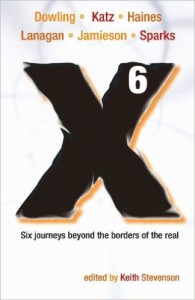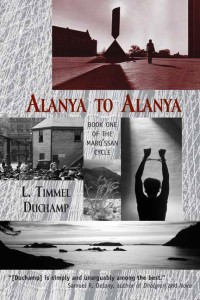The Otherwise Award is pleased to announce that the 2009 Otherwise Award has been awarded to the following two works:
- Greer Gilman, Cloud and Ashes: Three Winter’s Tales, (Small Beer Press 2009)
- Fumi Yoshinaga, Ooku: The Inner Chambers, volumes 1 & 2 (VIZ Media 2009)
Award Information
Conference Information
- Award Year: 2009
- Award Year Number: Year 19
- Conference: WisCon 34
- Date: 31-05-2010
- Location: Madison, WI
Award Winners
The 2009 jury chose 2 works for the Otherwise Award.
Greer Gilman’s book, Cloud and Ashes: Three Winter Tales, prompted much jury discussion on its way to winning the Tiptree. It is a slow read — a dense, poetic, impressionistic book, heavy with myth. Many of its images and elements are drawn from folk tales and ballads of the British Isles; patterns repeat, but also mutate in kaleidoscopic fashion and then mutate again. The language was especially difficult. Sometimes we felt we were floating through it; sometimes drowning. It is a paradoxical work. To enter the novel you must give up on understanding every word. You have to read the book on an instinctual level, yet the effect of the book is almost entirely intellectual. Power shifts about, much of it gender-based; time eats itself like a mobius strip. These are stories about Story in a world in which power seems to belong to the male but reality to the female. We on the jury admired Cloud and Ashes for its originality and found it a beautiful and highly memorable work. We chose Fumi Yoshinaga’s Ooku, Volumes 1 and 2 as our Tiptree winner with some trepidation. No one on the jury has read much manga; no one is an expert in Japanese history. What we fell in love with was the detailed exploration of the world of these books — an alternate feudal Japan in which a plague has killed 3/4s of Japan’s young men. In Ooku, the shogun and daimyo are women and much of the story takes place among the men in the Shogun’s harem. The first volume (set in a later time period than the second) shows us a world in which men are assumed to be weak and sickly, yet women still use symbolic masculinity to maintain power. The second volume focuses on the period of transition. Through-out the two books, Yoshinaga explores the way the deep gendering of this society is both maintained and challenged by the alteration in ratios. The result is a fascinating, subtle, and nuanced speculation with gender at its center.Cloud & Ashes: Three Winter's Tales by Greer Gilman (Small Beer Press, 2009)
Work Information
Title: Cloud & Ashes: Three Winter's TalesAuthor: Greer GilmanPublisher:
Publisher Name: Small Beer PressCountry: USAYear: 2009Ooku: The Inner Chambers, volumes 1 & 2 by Fumi Yoshinaga (VIZ Media, 2009)
Work Information
Title: Ooku: The Inner Chambers, volumes 1 & 2Author: Fumi YoshinagaPublisher:
Publisher Name: VIZ MediaCountry: USAYear: 2009
Award Honor List
See full details about the 2009 Honor List
The 2009 jury chose 7 works for the Honor List A dangerous plague is turning high school girls into ravishing beauties. We found this story’s illumination of teenage girlhood and its passionate desires to be a quite heartbreaking meditation on the meaning of beauty and femininity in the media and popular culture. Especially lovable — the main character. Especially pertinent to us — our protagonist’s hopeless assurances that really, girl geeks can grow up okay. Especially fabulous — the marvelous voice of the piece and the amazing ending. Singh has packed this novella-length work with an amazing complexity. Distances is: the story of a woman’s development as an artist in a context where science, art and religion are indistinguishable; a meditation on the uses of knowledge and the power structures they engender; and a nuanced depiction of cultural difference, loss and exile. While not as directly focused on gender as some other works on our list, we saw Distances as a work that expanded and challenged a number of inherently gendered cultural categories. Also, almost incidentally, there are some very interesting depictions of alternative sex and gender arrangements. Although we immediately loved this story, our initial reaction was that the centrality of a same-sex relationship in the place we might expect a heterosexual one wasn’t enough to persuade us that our understanding of gender was being explored and expanded. But the more we thought and talked about it, the more things we felt the story accomplished. Because a queer relationship does have a different connection to the reproduction of the species, to have a disturbing alien reproductivity routed through queer female bodies did feel radical and new. “Galapagos” made us think of the work of Octavia Butler. There can be no higher praise. We are all familiar with books in which the setting is some sort of fantasy/feudal blend and the gender roles appear unexamined and uninteresting. So one thing we loved about Lifelode was the way the society’s hierarchical, feudal social structure included both a traditional view of marriage, through which hereditary power is passed on, and an established tradition of polyamorous relationships. Life here is comfortable and relatively egalitarian; through Walton’s characters, we see the power inherent in traditionally feminine social roles. But Lifelode takes place at just that moment when the cozy village of Applekirk finds itself threatened by an alien and terrifying new monogamous order… A non-reproductive woman makes idealized child-objects in an uncertain world. McHugh’s story takes place only a tick away from where we now find ourselves, in a pressured environment of economic collapse where any act of generosity and open-heartedness is risky and a good person is a dangerous thing to be. This is not fundamentally a gendered issue, but it often expresses itself in gendered ways. An incredibly evocative, sparely written, powerful story. An interesting counterpoint to Ooku regarding projected effects of gender imbalance, Haines’ “Wives” is a sharp, deeply ugly look at white working class Australian masculinity in a world where women are scarce. The dystopian Australian outback where the story mostly occurs is a place of intense misogyny, racism, and transphobia. Horrible and chillingly believable, “Wives” didn’t do anything terribly original, but it did something familiar in a quite new, very visceral, very powerful way. After reading the thousands of pages in L. Timmel Duchamp’s five-volume Marq’ssan cycle (Alanya to Alanya, Renegade, Tsunami, Blood in the Fruit, and Stretto, following decades of changes across the world in both large-scale politics and the everyday interpersonal beauties and violences of individual lives, you don’t emerge quite the same as you were when you went in. Gender is a central focus, as we experience a very gender-segregated society largely from a female point of view and occasionally from that of a post-gender alien species. But any separation of one of the cycle’s themes must necessarily be a shallow depiction of what it is like to read these novels. Some readers will focus most on the story of human engagement with an utterly different alien race, determined to alter the course of human politics yet determined to be something other than colonizers. Some will be most fascinated by the tale of the Free Zones, anarchist enclaves where co-operative, anti-authoritarian politics develop over decades in the US and elsewhere. These communities are not utopian but are filled with conflict and occasionally violent, yet they remain optimistic nevertheless. For other readers, the most memorable aspects of the cycle will be the near-future dystopian image of an intensely class-divided United States, with its startlingly prescient depictions of torture, imprisonment, and political violence, told with an unsettling understanding of the oppressors’ perspective and yet never without losing sympathy for the victims. And for yet more, it will be on the level of character that Duchamp’s work inspires: her many point of view characters––almost all women––whose personal and political transformations, power-laden interpersonal, frequently sexual relationships, and critical analyses of the world, drive the many intersecting narratives.Beautiful White Bodies, Alice Sola Kim (Strange Horizons, US, 2009)
Distances, Vandana Singh (Aqueduct Press, US, 2008)
Galápagos, Caitlin R. Kiernan (Night Shade Books, US, 2009)
Lifelode, Jo Walton (NESFA Press, US, 2009)
Useless Things, Maureen F. McHugh (Night Shade Books, US, 2009)
Wives, Paul Haines (coeur de lion, Australia, 2009)
Special Honor
The Marq’ssan Cycle (Series), L. Timmel Duchamp (Aqueduct Press, US, 2005-8)
Award Long List
See full details about the 2009 Long List
The 2009 jury chose 10 works for the Long List
- Afterbirth, Stephanie Shaw (Small Beer Press, US, 2009)
- The Mere Future, Sarah Schulman (Arsenal Pulp Press, Canada, 2009)
- Slightly Behind and to the Left: Four Stories and Three Drabbles, Claire Light (Aqueduct Press, US, 2009)
Jurors
- Karen Joy Fowler (chair)
- Jude Feldman
- Paul Kincaid
- Alexis Lothian
- Victor J. Raymond
Award Ceremony
See full details about the 2009 Ceremony
The 2009 Otherwise Award was given to Greer Gilman and Fumi Yoshinaga at WisCon 34, May 31, 2013, in Madison, Wisconsin.
